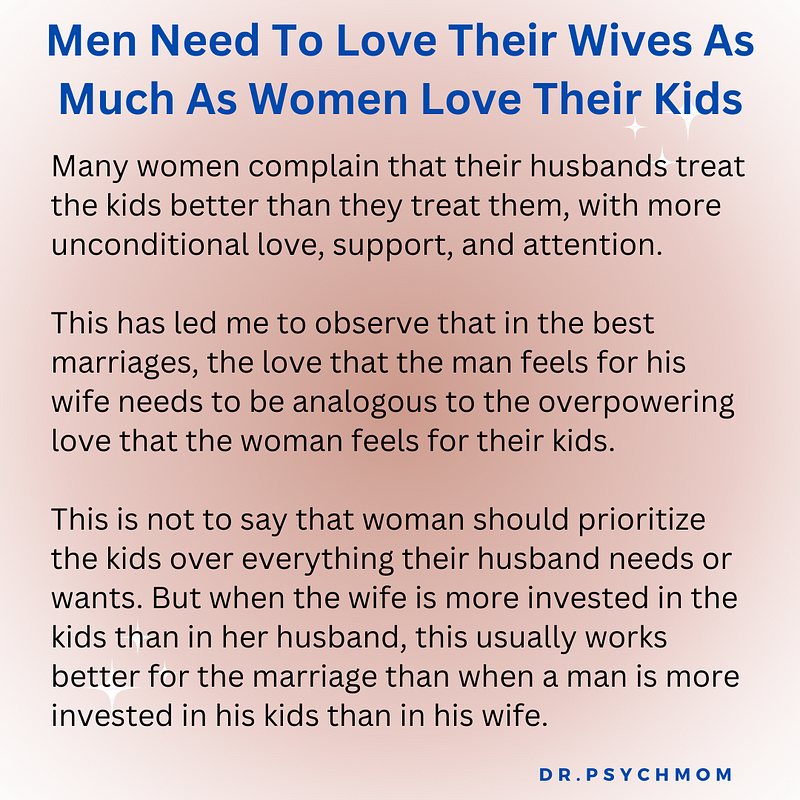Understanding the Balance of Love in Marriage and Parenting
Written on
Chapter 1: The Dynamics of Love in Relationships
In my quest to provide an honest view of couple dynamics, I’d like to delve into a crucial aspect of relationships that can lead to success. In previous discussions, I've pointed out that men should focus on the emotions behind their wives' words rather than the literal content. This mirrors how parents typically engage with their children; for instance, when a child is upset, the first step is to comfort them, followed by addressing their concerns.
Many women in couples therapy express that their husbands show greater affection and attention to the children than to them. This observation leads me to conclude that in the healthiest marriages, the love a man has for his wife should reflect the intense love a woman has for her children.

In my latest podcast discussing the significance of physical affection, I mention that if a house were to catch fire, most women would rush to save their children, while most men would attempt to rescue both their children and their wives. This difference likely stems from evolutionary roles, where men have traditionally been seen as protectors, regarding their wives and children with equal importance. If a man prioritizes his children’s needs over his wife’s emotional requirements, the marriage often suffers in happiness compared to the reverse scenario.
This is not to suggest that women should overlook their husbands' needs in favor of the children. I firmly believe in fostering a marriage-centered approach rather than one solely focused on the kids. A fulfilling intimate life benefits both the marriage and the children. That said, different priorities between genders often emerge regarding their roles as parents and spouses. It appears that when a wife invests more in her children than in her husband, this arrangement tends to enhance marital satisfaction, unlike when a husband does the same.
Section 1.1: Illustrating Prioritization in Happy Marriages
What might this prioritization look like in a thriving marriage? Consider Jack, a devoted husband and father. When the children express a desire to eat at McDonald's, but Jane, his wife, prefers sushi, Jack asserts, “Kids, we’re having sushi because your mom loves it! We can play outside later.” Jane, though willing to compromise, appreciates his decision and feels grateful for his support.
Key points from this scenario include:
- The husband actively seeks to please his wife daily while also being a loving father.
- In this case, the wife’s preferences take precedence over the children’s desires.
- The wife naturally balances her priorities, often placing the children’s needs above her own while still supporting her husband’s emotional desires.
You might argue that if he prefers sushi, she should align with that. However, I find that many men are not particularly invested in such choices as much as women are.
Subsection 1.1.1: The Importance of Mutual Affection
It’s often said that women thrive when they marry men who love them more than they love their husbands. This sentiment holds true today, though not in the traditional sense where women relied on men for financial stability. In contemporary contexts, it’s beneficial for both partners to share an equal affection before having children. Post-children, the most effective dynamic seems to occur when men place their wives’ needs above the children's, while women focus more on the kids’ needs.
When a woman feels supported by her husband throughout the demanding years of child-rearing, she is likely to remain committed once the kids grow up. Feeling cherished during those years allows her to reconnect with him fully after their children leave the nest.